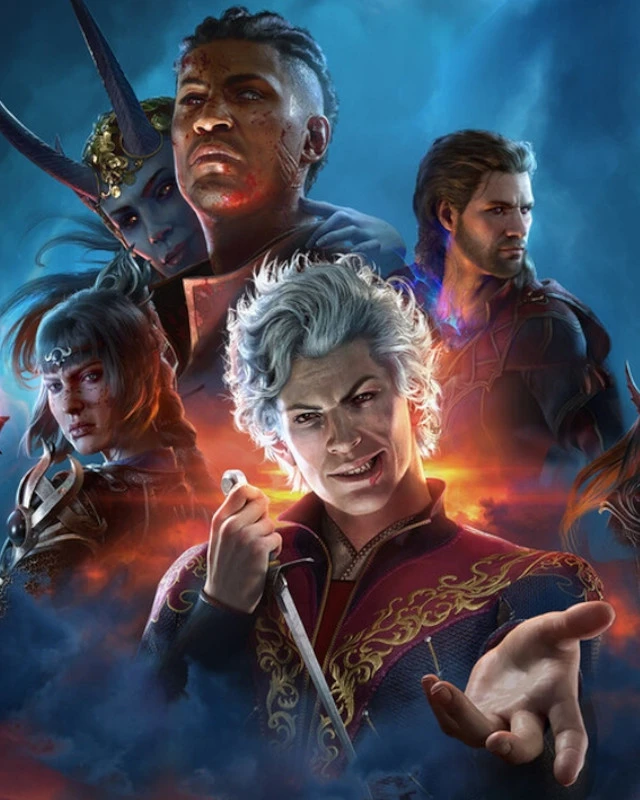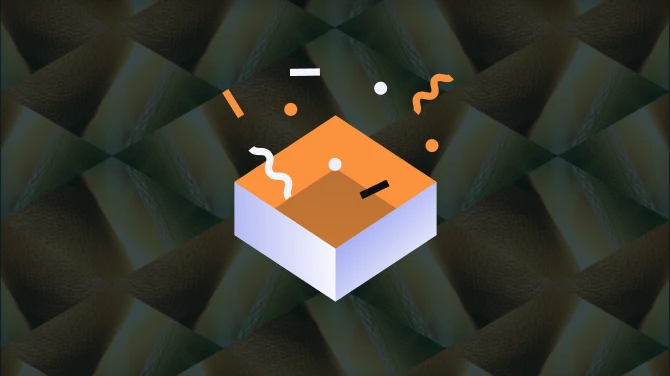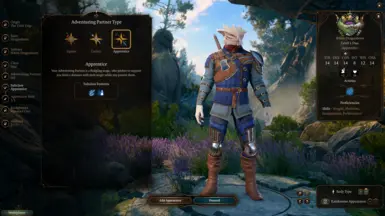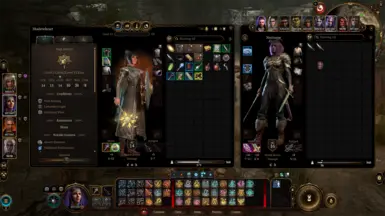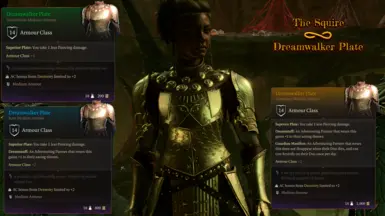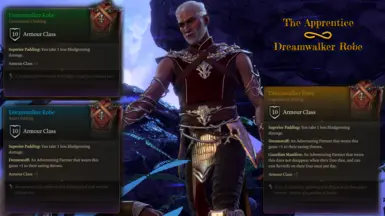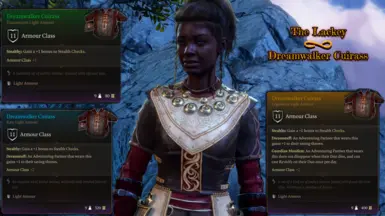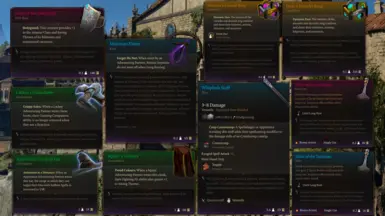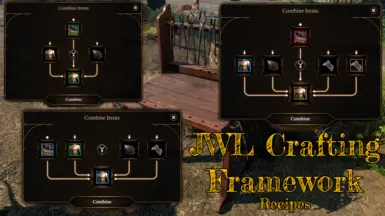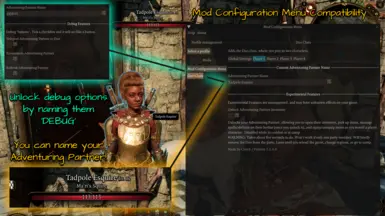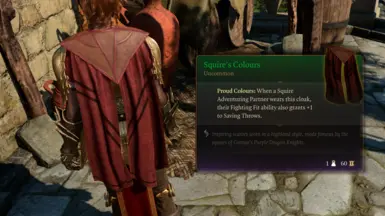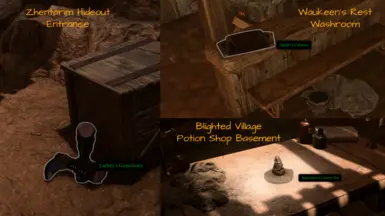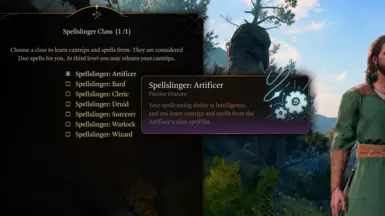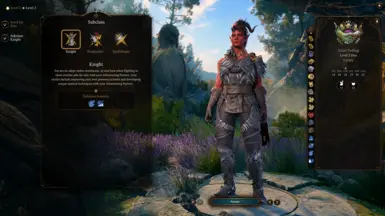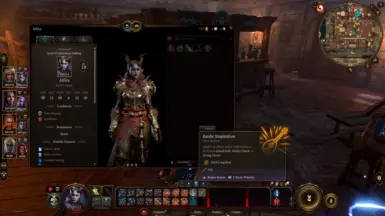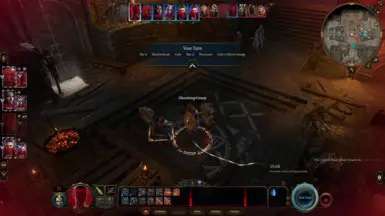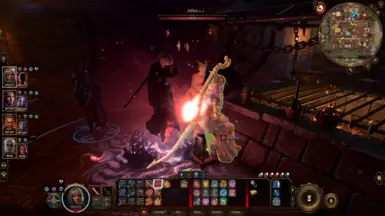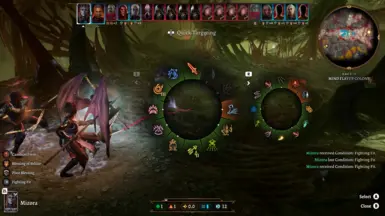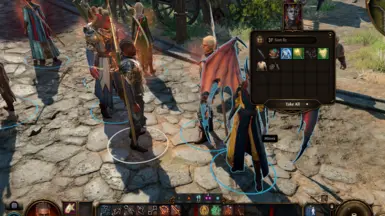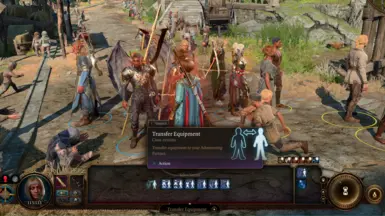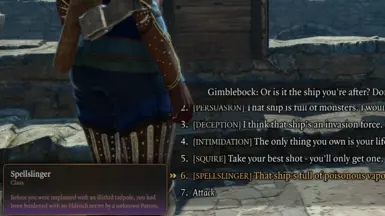About this mod
Introduces the Duo class, a homebrew class where you summon your Dream Guardian as a secondary character known as an Adventuring Partner that shares your turn, actions and hitpoints. Mix and match archetypes to create your ideal pairing, and hunt for psionic imprints to learn unique Tactics.
- Requirements
- Permissions and credits
- Changelogs
- Donations

A comet of arcane energy streaks across the battlefield as a horde of orcs bear down upon a ruined tower. She pants, her fingers shaking even as they dance to bring forth another spell. The orc-chief tosses the barricade aside with a sweep of his greatclub, closing the distance between them faster than she can work her magic.
Then, with a clash of steel and oak, a knight in chain and leather dashes past her to meet the orc-chief's swing. She grits her teeth and focuses her breath, steadied by his presence.
"Took you long enough."
The Knight grunts and, with a roar of exertion, his blade finds home in the orc-chief's ribcage. A mere moment is carved out of the chaos, but between them a moment is a conversation. A grin and a snort of acknowledgement is their conference of war. There is a twinkling of her eyes as she looks to the growing horde beyond.
Then, a blast of flame leaps from her hand and over his shoulder. He doesn't flinch. A heavy body collapses behind him, the stench of singed orc-flesh assaults their noses. She nods. So does he.
"Together?"
"Of course."
The duo stand with their backs to one another. Apart, they were warriors. Together, they are heroes.

Normally in BG3, you play as a single character, with a single turn, and a single set of equipment. But what's better than one character? Two, of course! The Duo has you summon your Dream Guardian as a second character, called your Adventuring Partner, that shares your turn, actions and abilities. When you become a Duo, you choose one of three types of Adventuring Partners to accompany you: an Apprentice, a Lackey, or a Squire. At second level, you choose an archetype for yourself from between the Knight, Ringleader and Spellslinger -- allowing you to mix-and-match your Duo to best suit your tastes!
To compare the Duo to an existing class, you can consider it a much more complex version of the Beastmaster. However, rather than summoning an animal companion that grows as you level up, this summoned creature is humanoid, and much more of your class features are devoted to developing both this summoned creature and your own abilities and synergy as a pair.
Duos use Tactics, abilities they can perform in and out of combat or that improve their Adventuring Partner's abilities, which are fuelled by Tactic Points. They also learn a Tadpole power called Imprint, which allows them to set their Adventuring Partner's appearance to one of 120+ creatures in the world, each with a unique bonus tactic!
The Duo has access to Dialogue Reactivity Tags, based off of the subclasses you choose. These dialogue options are the same as the classes they're taken from (see the subclass entries below for those classes), but will appear as and be attributed to your subclass instead! You get the dialogue tags of both your character, and the Adventuring Partner, letting you see a large swath of dialogue options!

1st-Level:2nd-Level:
- (Subclass) Adventuring Partner: You choose an Adventuring Partner from between the Apprentice, Lackey and Squire (see below). Adventuring Partners share your actions, hitpoints, ability scores and most of your proficiencies. They use their own equipment, and have their own equipment proficiencies and temporary hitpoints.
- Last Stand: When you or your Adventuring Partner are downed, the other remains at 1-hitpoint and has one additional turn to act before becoming Incapcitated.
- Additional Proficiencies: Depending on what Adventuring Partner you chose, you also gain proficiency in Strength (Squire), Intelligence (Lackey) or the spellcasting ability of your Apprentice (see below) Saving Throws; and another skill proficiency.
- Partner Feature: The Apprentice gets Selfless Spellcasting, the Lackey gets Cunning Companion, and the Squire gets Fighting Fit.
3rd-Level:
- Double Tap: When you or your Adventuring Partner attack during your turn, the other may perform an Attack or cast a Weakened Cantrip as a Bonus Action. Until 5th-Level, this bonus attack is made at disadvantage. A weakened cantrip is cast as though its caster were 1st level: it deals only one damage die, and can have only one target.
- (Subclass) Duo Archetype: You choose a subclass from between the Knight, the Ringleader, and the Spellslinger (see below).
- Duo Archetype Feature: Knights get Screening, Ringleaders get Gang Up and Spotter, and Spellslingers get Selfless Spellcasting.
4th-Level:
- Tactics: You learn 3 Tactics (see below), and have a number of Tactic Points equal to your Duo Level. You regain all spent Tactic Points when you finish a long rest, or half your maximum amount of Tactic Points when you finish a short rest. Some tactics have prerequesites, and can only be chosen if these prerequesites are met.
5th-Level:
- Feat: You choose a feat.
6th-Level:
- Improved Double Tap: Double Tap attacks are no longer made at Disadvantage.
- Partner Feature: An Apprentice gains Sheltering Ward, a Lackey gains Helping Hand, and a Squire gains Back-to-Back
- New Tactic: You learn a new Tactic.
7th-Level:
- Duo Archetype Feature: Knights get Unyielding, Ringleaders get Provocation, and Spellslingers get Universal Cantrip.
8th-Level:
- Unshakeable Bond: While within 100ft of each other, you and your Adventuring Partner are immune to being Frightened or Charmed.
- Partner Feature: An Apprentice gains Transposition, a Lackey gains Relentless, and a Squire gains All-Out Attack
- New Tactic: You learn a new Tactic.
9th-Level:
- Feat: You choose a feat.
10th-Level:
- New Tactic: You learn a new Tactic.
11th-Level:
- Partner Feature: An Apprentice gains Magnum Opus, a Lackey gains Take Advantage, and a Squire gains Blaze of Glory.
12th-Level:
- Always Ready: You gain a second Reaction, which your Adventuring Partner can also use.
- New Tactic: You learn a new Tactic.
- Feat: You choose a feat.
And if you have a mod that unlocks levels beyond level 12:
13th-Level:14th-Level:
- New Tactic: You learn a new Tactic.
- 4th Level Spellcasting: Spellslingers and Apprentices unlock 4th level spells.
15th-Level:
- Duo Archetype Feature: Knights get Bannerlord, Ringleaders get Bounty Hunter, and Spellslingers get Catalysis
16th-Level:
- New Tactic: You learn a new Tactic.
- Partner Feature: An Apprentice gains Strategic Reserves, a Lackey gains Deep Cuts, and a Squire gains All-Out Attacks (plural).
17th-Level:
- Feat: You choose a feat.
18th-Level:
- New Tactic: You learn a new Tactic.
- 5th Level Spellcasting: Spellslingers and Apprentices unlock 5th level spells.
19th-Level:
- Always Ready (II): You gain an extra Bonus Action, which your Adventuring Partner can also use.
20th-Level:
- New Tactic: You learn a new Tactic.
- Long Goodbye: As long as your Adventuring Partner is alive, you and your Adventuring Partner are invulnerable when you are Downed, and can only die by losing your Death Saving Throws.
- Feat: You choose a feat.

The following apply to Adventuring Partners:
- An Adventuring Partner's appearance and race is determined by the apperance of your Dream Guardian, unless you use Imprints (see below).
- A Duo and their Adventuring Partner always share their initiative and act on the same turn, with the Duo's initiative taking precedence.
- A Duo and their Adventuring Partner have a shared hitpoint total. When one of them takes damage, the other takes that much damage as well.
- A Duo and their Adventuring Partner share their actions. For example, when one of you uses their Action, the other's Action is used as well. Once you have Tactic Points, these are shared as well.
- A Duo and their Adventuring Partner share the same base ability scores. For example, if a Duo has 13 Strength, but has their Strength score improved by an Elixir of Cloud Giant's Srength, your Adventuring Partner's strength is still 13... unless they also have something improving it.
- When an Adventuring Partner dies they are unsummoned, and are resummoned when you finish a long rest.
- Adventuring Partners are summoned creatures, as such they cannot talk or have their inventory accessed. However, their inventory can be accessed while in camp, and you can 'loot' them as though they were a container while in the world. You also get a spell called Transfer Equipment that lets you swap equipment with your Adventuring Partner

If you choose the Apprentice, your Adventuring Partner is a novice spellcaster. An Apprentice prefers to keep their distance, supporting you and your allies with their magic. An Apprentice is proficient with simple weapons, and not with any armour.
When you choose the Apprentice, you also choose between the Bard, Cleric or Wizard for your Apprentice to learn spells from, and their spellcasting ability will match that of the class you chose. Apprentices learn cantrips and spells from their chosen class, which they cast using a number of Tactic Points equal to that spell's level instead of Spellslots. These spells are considered Duo spells. You are also tagged as belonging to this class, and will see it's options in dialogues.
At 1st-Level, the Apprentice grants you proficiency with the Saving Throw of their spellcasting ability (Charisma for Bard, Wisdom for Cleric or Intelligence for Wizard), and grants you skill proficiency with Performance and Musical instruments if you chose Bard, Religion if you chose Cleric, or Arcana if you chose Wizard.
1st Level - Selfless Spellcaster:
From 1st-Level, an Apprentice can cast Duo spells they know with a range of Self on their Duo as though they had a range of touch. For example, an Apprentice Cleric could cast Thaumaturgy on their Duo, which normally can only be cast on themselves.
3rd Level - Spellcasting:
From 3rd level, after gaining Tactic Points, an Apprentice learns and can cast spells from the class you chose. Apprentices are half casters, unlocking 2nd-level spells at 5th level and 3rd-level spells at 9th. Apprentices learn a new spell every level, and can relearn a spell every level as well. You choose their spells while levelling up, but only your Apprentice can cast them -- unless you choose the Shared Magicks tactic and are yourself a Spellslinger.
5th Level - Sheltering Ward:
From 5th level, while they are not incapacitated, your Apprentice projects a 20ft (6m) aura. Allied creatures within this aura add your Apprentice's spellcasting ability modifier to their saving throws against spells. The bonus for this aura applies at all times, but the visual effect appears only while in combat.
7th Level - Transposition:
From 7th level, you and your Apprentice can teleport and exchange places with one another while within 300ft as a Bonus Action by spending a Tactic Point. While not in combat, this ability doesn't cost a Tactic Point.
10th Level - Magnum Opus:
At 10th level, your Apprentice learns a 4th level spell from their chosen class. They can cast this spell once per day, and without using Tactic Points.
15th Level - Strategic Reserves:
From 15th level, you regain all your Tactic Points when you short rest, instead of only half.

If you choose the Lackey, your Adventuring Partner is a loyal henchman. A Lackey prefers to fight alongside their Duo, darting through combat where needed. A Lackey is proficient in Light Armour and Simple and Martial weapons. In addition, you are tagged as a Rogue and will see their options in dialogues.
At 1st-level, your Lackey grants you proficiency in Intelligence Saving Throws, and you can choose two of any skill from Sleight of Hand, Deception, Persuasion, or Acrobatics to become proficient in.
1st Level - Cunning Companion:
From 1st-level, when a Lackey attacks a creature, that creature cannot make attacks of opportunity until the start of their next turn or until the Lackey uses their Reaction or loses the ability to perform Reactions, such as from being downed or performing an Attack of Opportunity.
5th Level - Helping Hand:
From 5th-level, your Lackey may perform a Help, Disengage, Hide or Dash action instead of attacking as a bonus action when Double Tapping, and their Help, Disengage, Hide and Dash actions also count as an attack for triggering Double Tap.
7th Level - Relentless:
From 7th-level, you and your Adventuring Partner have advantage on attacks made against creatures the other has attacked during your turn. For example, if you attack a goblin, your Lackey gets advantage on their Double Tap attack against that same goblin.
10th Level - Take Advantage:
From 10th-level, when you or your Adventuring Partner roll a natural 20 or 1 when performing an attack roll, saving throw or ability check in combat, until the end of your next turn, the other character gains advantage on their next attack roll, saving throw, or ability check.
15th Level - Deep Cuts:
From 15th-level, the number your Adventuring Partner needs to roll in order to critically hit when performing an attack with Double Tap is reduced by 2. This effect can stack.

If you choose the Squire, your Adventuring Partner is a brave warrior. A Squire is just as able to fight on their own as alongside their Duo or their allies, and generally leads in combat compared to their Duo. A Squire is proficient with simple and martial weapons, shields, and light and medium armour. In addition, you are tagged as a Fighter, and will see their options in dialogues.
At 1st-level, a Squire grants you proficiency with Strength Saving Throws, and you also gain skill proficiency in one of your choice of Athletics, Survival, Intimidation and Animal Handling.
1st Level - Fighting Fit:
From 1st-level, when you or an Ally are within 5ft (1.5m) of your Squire, both your Squire and that creature get +1 to their Armour Classes. This does not stack with other creatures or other Squires.
5th Level - Back-to-Back:
From 5th-level, when you or an Ally are attacked by a creature within melee range of your Squire, you may spend a Reaction to have your Squire perform an attack of opportunity against that creature.
7th Level - All Out Attack:
From 7th-level, after performing an attack, your Squire may perform an extra attack that turn. If they do, the first attack made against them until the start of your next turn is made with advantage.
10th Level - Blaze of Glory:
From 10th-level, when you are downed in combat and your Squire enters Last Stand, they also gain a number of Temporary Hitpoints equal to twice their level. While they possess these temporary hitpoints, their movement speed is doubled and attacks they make are made with advantage, and they do not become incapacitated due to Last Stand. These temporary hitpoints are lost when you are brought back above 0 hitpoints.
15th Level - Extra All Out Attack:
From 15th-level, after performing an extra attack with their All-Out Attack feature, your Adventuring Partner can perform a third attack that turn. If they do, instead of only the next attack against them being made at advantage, all attacks made against them until your next turn are made with advantage.


As a Knight, you are a skilled melee combatant, and your tactics improve your ability to survive and deal damage on the battlefield. You gain proficiency with Medium Armour, Shields and Martial Weapons, and are tagged as a Fighter and will see their options in dialogues.
From 2nd-level, while your Adventuring Partner is within 5ft (1.5m) of you, or within 5ft of an enemy creature adjacent to you, both you and your Adventuring Partner gain +1 to your Armour Class.
6th Level - Unyielding:
From 6th-level, you become proficient in Heavy Armour. In addition, when you start your turn while in combat, you gain a number of temporary hitpoints equal to your Proficiency Bonus.
14th Level - Bannerlord:
From 14th-level, during your turn you may spend 4 Tactic Points to have your next Attack cost no action. There is no limit to the amount of times you can use this ability (other than Tactic Points).

As a Ringleader, you are a cunning specialist, and your tactics improve the capabilities of your Adventuring Partner and allies both in and out of combat. You gain proficiency with Martial Weapons, and are tagged as a Rogue and will see their options in dialogues.
From 2nd-level, you gain the Sniper Shot ability, which lets you perform a mainhand ranged weapon attack at double that weapon's normal range as long as your Adventuring Partner is within 5ft (1.5m) of you, or your target is within 10ft (3m) of your Adventuring Partner. You may also use Sniper Shot when Double Tapping.
6th Level - Provocation:
From 6th-level, you gain the Provocation Tactic, which lets you 'provoke' either an ally or an enemy by spending 2 Tactic Points. Provoking an Ally grants them +3 to Initiative rolls, while Provoking a non-allied creature will give them -3 to their Initiative rolls, and count as a crime - generally starting combat. This effect lasts until long rest, or you enter combat.
14th Level - Bounty Hunter:
From 14th-level, every time you or your Adventuring Partner kill a creature you gain a Tactic Point. This ability triggers only once each encounter for each of you (i.e. you can get up to 2 Tactic Points per encounter).

As a Spellslinger, you are a burgeoning spellcaster, and your tactics generally focus on improving your magical power. Like an Apprentice, you choose a class to learn cantrips and spells from, but you are able to choose from any spellcasting class. You are tagged as that class, and will see their options in dialogues.
From 2nd-level, you learn spells from your chosen class. You only learn spells from the base class's spell list, so for example, you won't learn any additional spells added to the spell list by the Fiend Patron, Cleric Domains, or Druid Circles. You cast these spells as Duo Spells, meaning you can cast them by spending a number of Tactic Points equal to their spell level instead of a spell slot.
The Spellslinger is a Half Caster, and unlocks 2nd level spells at 5th level and 3rd level spells at 9th level. You learn a new spell from your chosen spell list every level, and can relearn a spell every level as well. Spellslinger spells you choose cannot be cast by your Adventuring Partner if they are an apprentice -- unless you choose the Shared Magicks tactic.
You can toggle casting with spellslots instead, if you have spellslots, by pressing the 'Disable Tactic Spellcasting' toggleable passive in your Passives hotbar.
2nd Level - Selfless Spellcasting:
Like an Apprentice, you can cast Duo spells you know with a target of Self as though they had a range of touch on your Adventuring Partner. For example, a Druid Spellslinger can cast Shillelelagh on their Adventuring Partner (provided they are holding a club or quarterstaff, of course).
6th Level - Universal Cantrip:
At 6th-level, you learn a single cantrip from any class spell list you could have picked your Spellslinger cantrips from. This cantrip is considered a Duo spell for you, and thus benefits from features such as Double Tap and/or Selfless Spellcasting.
14th Level - Catalysis
From 14th-level, you can upcast your Duo spells up to the level above the highest level Duo spell you know. For example, if you know 5th level Duo spells, you can upcast any Duo spell to a 6th level spell.

- Apprentice's Talent: Your Apprentice's spellcasting ability is equal to your own base ability score, or 8 + your Duo Level, whichever is higher. Requires the Apprentice.
- Arcane Reserves: Your Adventuring Partner gains a single spell slot, which they can use to cast spells they know instead of Tactic Points. This spell slot's level is equal to the highest level spell they can cast, and is restored when you finish a short rest. Requires the Apprentice.
- Armour Training: If your Adventuring Partner is a Squire, they become proficient in Heavy Armour. If your Adventuring Partner is an Apprentice, they become proficient in Light Armour. Requires either the Apprentice or the Squire, and 5th level or higher.
- Bounty: Your Adventuring Partner learns and can cast the Hunter's Mark spell with Tactic Points. In addition, both their and your attacks benefit from their marking spells, such as Hunter's Mark or True Strike. Requires the Lackey.
- Castle: Your Adventuring Partner can expend 5ft of movement to swap places with an ally within 5ft of them. Allied creatures adjacent to your Adventuring Partner also gain this ability, though they can only swap places with your Adventuring Partner.
- Collaborative Effort: As long as your Adventuring Partner is not Blinded, Incapacitated or Restrained, when an allied creature within 15ft (4.5m) of them performs an attack roll or ability check, you may use your Reaction and spend a Tactic Point to add 1d4 to that roll. Requires the Ringleader.
- Combat Casting: Casting a spell now triggers Double Tap. (Note, Cantrips already trigger Double Tap, this only cares about levelled spells)
- Double Down: When you miss with an attack, you may forgo triggering Double Tap in order to reroll the attack roll for the attack.
- Draw Out: When you or your Adventuring Partner are attacked by a creature with an Attack of Opportunity during your turn, the first attack the other one makes against that creature this turn is made with Advantage.
- Dual Manouevres: When you or your Adventuring Partner perform a Dash, Jump, Disengage or Hide action, the other may perform a Dash, Jump, Disengage or Hide action for free this turn.
- Expert Accomplice: Your Lackey now gives you Expertise in the skills you chose for their Additional Proficiencies feature at 1st level. Requires the Lackey, and 5th level or higher.
- Extra Training: Your Tactic Point total is increased by two.
- Heightened Cantrip: When you or your Adventuring Partner may cast a Weakened Cantrip thanks to Double Tap, you may choose to spend a Tactic Point to have that cantrip be cast at full power. This ability can be toggled on or off while you have Double Tap active.
- Lackey's Finesse: Your Lackey's Dexterity is equal to either your own base Dexterity score, or 8 + your Duo level, whichever is higher.
- Move as One: You can toggle this ability during your turn to combine and share your and your Adventuring Partner's movement speed. For example, if you both have 30ft of movement, when you toggle this passive it becomes 60ft, and when you move it subtracts from both totals: allowing you to move 50ft and your partner to move 10ft. This ability toggles off at the end of turn, and must be manually turned on each turn.
- Reposition: During your first turn when you enter combat, you may spend either a Bonus Action or a Tactic Point to teleport and position your Adventuring Partner within 15ft (4.5m) of you.
- Shared Magicks: You and your Adventuring Partner share spellbooks, allowing either of you to cast Duo spells the other has learned. Requires Apprentice and Spellslinger.
- Spellswinger: You may spend your Reaction and a Tactic Point to become proficient with the weapon you are holding as you cast this, and you attack with your spellcasting ability instead of your strength/dexterity for that weapon for 10 turns. This effect ends early if you unequip the weapon or dismiss it during your turn, and when it ends the spent Tactic Point is returned to you.
- Squire's Prowess: Your Squire's Strength is equal to either your own base Strength score, or 8 + your Duo level, whichever is higher.
- Taunt: As a bonus action, your Adventuring Partner may spend a Tactic Point to force each enemy within 10ft (3m) to make a Charisma saving throw. On a failed save, attacks they make against creatures other than your Adventuring Partner are made with disadvantage until the start of your next turn. A creature that is Blinded or Silenced cannot be affected by this. Requires the Squire.
- Tip and Trip: If you and your Adventuring Partner are adjacent to the same creature when you attack them, you may spend a Tactic Point to attempt to shove it prone in addition to attacking it. If the attempt fails, the Tactic Point is returned to you, and the same tactic cannot be attempted against the creature until the start of their next turn.
- Understudy: Your Adventuring Partner gains the passive features of each feat you have. Ability Score Improvements and Spells Learned are ignored.
- Vault: You or your Adventuring Partner may perform a special jump by spending a Tactic Point and a Bonus Action. This jump does not provoke Attacks of Opportunity. (Note: The game will still warn you that it will, but no attacks should be triggered.)
- Vicious Attacks: When you miss with an attack, you still deal damage equal to your attack modifier. Can be disabled from the Reactions menu. Requires the Knight.
- Vulnerable Criticals: When you or your Adventuring Partner perform a critical hit against a creature and it isn't a killing blow, you may turn that attack into a normal hit. If you do, the other character's next attack against the same target is guarenteed to hit, but cannot be a critical hit.

Adventuring Partners will start wearing a version of their Dream Guardian armour that fits their archetype: Squires will have the default guardian's breastplate, while Lackeys have leather armour and Apprentices have robes with custom modelwork to resemble the Dreamwalker Plate. A Duo's Dream Guardian will even wear this armour while in cutscenes.
Items added:
- Encoder/Decoder Rings: A pair of Legendary Rings that allow two characters to pair up like a Duo and their Adventuring Partner, while also combining and sharing their action resources, hitpoint totals, and turn. If one character wears both rings, or a Duo tries to pair with their Adventuring Partner, they instead gain immunity to psychic damage and most mental debuffs.
- Whiplash Staff: A magic staff that gives +1 to Spell Attack Rolls, and gives the wearer access to a bonus action cantrip that deals 1d4 magical bludgeoning damage called Contrecoup. Contrecoup can only be cast if the wearer shares their initiative with an ally that has attacked during their turn, or they have used the help action that turn. Spellslingers and Apprentices add their spellcasting modifier to the damage of Contrecoup.
- Squire's Colours: A cloak that upgrades the Squire's Fighting Fit ability to also give +1 to Saving Throws. It uses the model of Isobel's cape, which otherwise is not available as a cloak.
- Lackey's Gumshoes: A pair of boots that upgrades the Lackey's Cunning Companion ability so that enemies the Lackey has attacked still cannot make attacks of opportunity until their next turn even if the Duo/Lackey have used their reaction.
- Apprentice's Conical Hat: A hat that upgrades the Apprentice's Selfless Spellcasting ability so that it has a range of 15ft, instead of 5ft.
- Ring of the Shepherd: A ring that gives the wearer's summons and follower creatures +1 to their AC and Saving Throws. If an Adventuring Partner wears the ring, their Duo instead gets the bonus to their defences.
- Memento Vivere: An amulet that, when worn by an Adventuring Partner, prevents any Imprint from wearing off when they long rest. An imprint prolonged this way will wear off if the amulet is removed - and if the Partner dies.
- Dreamwalker Armours: A breastplate, leather armour, and robes used as starting gear for the Squire/Lackey/Apprentice respectively. Can be upgraded into a +1 uncommon variant, which itself can be upgraded into a +2 rare variant using the JWL Crafting Framework mod and infernal iron. Uses the Smith's Tools.
- Legendary Dreamwalker Armour: A legendary variant of the Adventuring Partner's starting armour, acquired by upgrading the +2 rare variant of the Dreamwalker armour, infenral iron, enriched infernal iron, and a legendary alloy dropped by the Steelwatch Titan called Planar Electrum Alloy. Gives +2 to AC, +1 to saving throws when worn by a Partner, and prevents an Adventuring Partner from disappearing when their Duo dies, while also giving them a single use of Revifivy that can only target their Duo.
- Elixir of the Tactician/Strategist: A pair of elixirs that give +2/+4 Tactic Points to the drinker. Like other elixirs, it lasts until long rest, and replaces the effects of other elixirs.

Your Illithid Tadpole allows you to summon a Psionic Construct, an Adventuring Partner to accompany you and share in your experiences and exploits. However, as you progress in your Adventure, your tadpole will resonate with certain notable minds. You can extract a psionic imprint of such creatures, allowing your Adventuring Partner to take their form and, while not true copies, they may yet possess an echo of the original's abilities...
After unlocking Tadpole powers, a player character Duo gains the use of a new tadpole ability called Imprint. When previewing Imprint, creatures capable of being imprinted from (and a handful of objects that were exposed to powerful echoes of psyche) will glow, showing they are suitable targets. Using Imprint on such targets will transform your Adventuring Partner into a copy of the creature you've imprinted, and grant a bonus Tactic, unique to that form. An imprint lasts your Adventuring Partner dies or you long rest - unless your Partner is wearing a Memento Vivere.
There are over 120 creatures able to be imprinted from in the game, scattered across the world, each with a unique passive. A full list can be found in the articles section of this mod; but I recommend going and looking for them in game. Feel free to suggest any NPCs you want to be able to imprint, and I'll add them to the list - or tell you if they're already on it!
In general, a creature will need to be imprinted while non-hostile and alive, but a handful of creatures can be imprinted even while dead. Some imprints aren't even taken from creatures at all, but items! Some imprints can be found from multiple places. Have fun hunting for them all!
Once an imprint is taken, a creature cannot be imprinted from again that day. If an imprinted creature would join your party, their imprint is ended early. The Imprint power itself is usable once per short rest, and cannot be used while your Adventuring Partner remains imprinted.
You can toggle between the appearance of the Imprinted Character, or your Dream Guardian, by use of a passive granted while imprinted. Adventuring Partners that have the imprint appearance toggled off will have a psychic glowing effect to show they are still imprinted.

The Duo is a big, complicated mod that does a lot of things the game wasn't quite intended to do. This makes it difficult to know for certain what is and is not compatible with it, but as a Class mod, it shouldn't touch much else that other mods do. Still, if you run into an issue, I'll do my best to resolve it!
- The Duo is known to be compatible with 5e Spells, and Mystra's Spells. Other mods that add spells are untested. If you have issues, place the Duo above any mod that adds spells other than these two.
- Mods that add new options for the Dream Guardian should be compatible with your Adventuring Partner's appearance. I highly recommend Whispers of the Guardian - Dragonborn Guardian by Trips.
- Show Me My Dream Guardian! - I actually made SMMDG while working on this mod; so it's already baked into the Duo, you won't need both but it also won't hurt anything.
- I've tested the Duo with Kay's Hair Extensions and Bangs Bangs Everywhere; and I'm confident that visual mods that affect the Dream Guardian will in fact show up on your Adventuring Partner.
- The Duo supports level unlocking up to level 20.
- If you have the Artificer class mod installed, you can choose it as your Spellslinger class.
- If you have JWL Crafting Framework mod installed, you can use its Smith's Tools item to upgrade your Adventuring Partner's starting gear.
- If you have the Mod Configuration Menu installed, you'll have access to various debug options, but also the ability to rename your Adventuring Partner!
INCOMPATIBILITY
- The Bounty Tactic will behave incorrectly with any mod that alters the vanilla versions of Hex, Hunter's Mark, or True Strike.
- Mods that add spells that rely on Script Extender (that is, the spells need script extender, not the mod) will work unpredictably if at all with the Spellslinger.

Special Thanks to the BG3 Modding Community and Larian Studios Discord for putting up with me learning the ropes to getting something like this out there. A big thanks to Norbyte and his Script Extender that continues to let us do things the Modding Toolkit can't. Thanks to wesslen's Echo Knight subclass mod for starting me down this path all of four months ago. And special thanks to my long suffering DM, who made the mistake of letting me homebrew once, and it got all out of hand. Now, go have fun!
Special thanks to forvrknight for a fix to help the Spellslinger better handle unexpectedly formatted spells.
